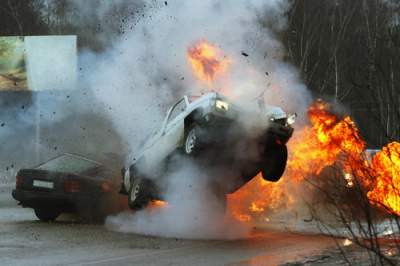Houston Car Accident Lawyers > Articles > Auto Accidents > Intoxication Manslaughter and Vehicular Manslaughter In Texas
Intoxication Manslaughter and Vehicular Manslaughter In Texas

The State of Texas takes manslaughter very seriously. Houston and Harris County have some of the highest occurrences of manslaughter. If you would like to speak to an attorney in Houston, call (832) 463-1003.
What is “Vehicular Manslaughter” in Texas?
Texas Penal Code Section 19.04 tells us that a person who “recklessly causes the death of another” can be charged with manslaughter.
This is equally true when it comes to operating a motor vehicle.
If a driver recklessly operates a vehicle under Section 454.401 of the Texas Transportation Code and causes someone’s death, he or she may be charged with vehicular manslaughter.
From the outset, the prosecution must prove the charged driver was operating his or her vehicle “recklessly.”
However, there are certain other situations where an individual might also be charged with vehicular manslaughter.
Texas Transportation Code 545.420 tells us an individual may be charged with vehicular manslaughter if they cause the death of another:
- While participating in a race;
- While participating in a speed competition or contest;
- While participating in a drag race or acceleration contest;
- While participating in a test of physical endurance of the vehicle’s driver; or
- In connection with a drag race or exhibition of vehicle speed or acceleration, or to make a vehicle speed record.
Texas Transportation Code 521.457 also tells us a person can be charged with vehicular manslaughter if they cause the death of another while driving on a suspended license.
The prosecution will not need to prove “recklessness” to convict an offender under 545.420 and 521.457.
What is “Intoxication Manslaughter” in Texas?
Texas Penal Code Section 49.08 tells us a person can be found guilty of intoxication manslaughter if they operate a motor vehicle while intoxicated and cause the death of another.
In Texas, the legal definition of intoxicated is a blood alcohol content of .08 or above.
What are the Punishments for Each Offense?
Typically, vehicular manslaughter in Texas is a Second Degree felony. This means a prison sentence from 2-20 years and potentially a fine up to $10,000.
The penalties for intoxication manslaughter are the same – 2-20 years in prison and a potential fine up to $10,000.
However, if the individual killed was a firefighter, police officer, or other emergency medical personnel, the offender can be charged with a First Degree felony. That means a prison sentence of five years to life in prison and a potential $10,000 fine
If convicted of vehicular manslaughter, an offender may have his or her driver’s license suspended for up to 1 year. For intoxication manslaughter, the offender’s driver’s license will be suspended for 180 days up to 2 years.
If convicted of vehicular manslaughter based upon causing the death of another while driving on a suspended license, the offense is a Class A misdemeanor punishable by a fine up to $4,000 and a jail sentence up to 1 year.
If convicted of vehicular manslaughter based upon racing on a highway that causes the death of another, the offense is a Second Degree felony, punishable by 2-20 years in prison and a potential fine up to $10,000.
